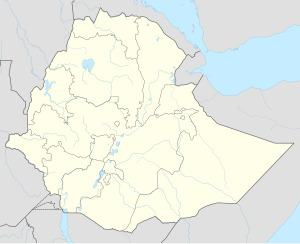Shiket
|
Abala Shiket |
|
|---|---|
| Location in Ethiopia | |
| Coordinates: 13°22′N 39°45′E / 13.367°N 39.750°ECoordinates: 13°22′N 39°45′E / 13.367°N 39.750°E | |
| Country |
|
| Region | Afar Region |
| Zone | Administrative Zone 2 |
| District | Abala |
| Elevation | 775 m (2,543 ft) |
| Population (2005) | |
| • Total | 4,820 |
| Climate | BSh |
Abala (also known as Shiket) is a town in north-eastern Ethiopia. The administrative center of Zone 2 of the Afar Region, this town has a latitude and longitude of 13°22′N 39°45′E / 13.367°N 39.750°E with an elevation of 1482 meters above sea level.
Abala is an important trading center in the area for goats, with its market day on Thursday, and supplied by pastoralists from as far away as Afdera, Erebti and Teru woredas.
Werner Munzinger visited Abala in June 1867 (which he calls Ala), and mentions that it was the home of Hodeli, a chief of the Dumhoeta Afar, as well as the location of a weekly market on Saturday primarily in salt.
Records at the Nordic Africa Institute website mention the existence of an English mission school, and a church dedicated to Saint Michael.
In July 2010, the Ethiopian Roads Authority awarded the contract to construct a 63 kilometer gravel road from Abala to Shaigubi to Sur Construction, which is owned by the Endowment Fund for the Rehabilitation of Tigray. The contract was worth 707 million Birr. The contract for a second road 109 kilometers in length, from Shaigubi through Male to Dalol, was awarded to Defence Construction and Engineering Enterprise, a division of the Ministry of Defense, and was worth 185 million Birr. These two roads would enable Salnik Coal Mining Plc, an Indian company, to extract potash from its concession at Dallol in the Afar Depression.
...
Wikipedia

